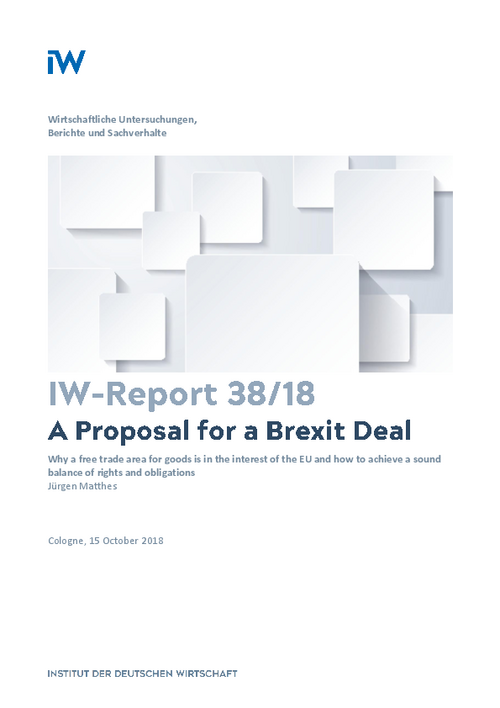In the political declaration of the Withdrawal Agreement the EU should leave the door open for a free trade area for goods that has been suggested by the UK’s Chequers proposals.

A Proposal for a Brexit Deal: Why a free trade area for goods is in the interest of the EU and how to achieve a sound balance of rights and obligations
IW-Report

In the political declaration of the Withdrawal Agreement the EU should leave the door open for a free trade area for goods that has been suggested by the UK’s Chequers proposals.
The EU would profit from such an arrangement due to its comparative advantage in goods. However, in order to achieve the EU’s main objective to avoid bandwagon effects, such a trade agreement must not be depicted as a favourable deal for the UK. The narrative of the four freedoms is not indispensable to prevent bandwagon effects. A narrow interpretation can be even counterproductive, if the EU continues to regard a lesser degree of service trade integration (as suggested by the UK) as a key stumbling block for a free trade area for goods. On closer inspection, less service trade integration is not a real problem, because it would not lead to relevant competitive distortions as feared by the EU, as other areas like labour costs and social contributions are more relevant cost factors which are not (and should not) be harmonised in the EU. Moreover, the UK proposes to agree to binding rules to prevent distortions of a level playing field in terms of environmental regulations, state aid and competition policy.
A new and economically stronger narrative is possible that avoids bandwagon effects but also allows for a free trade area for goods. The EU can and should clearly point out that an FHA 3.0 with more restrictions on services than today (particularly in financial services) is the contrary of a favourable deal for the UK. The British government will not obtain what is normal in bilateral FTA negotiations where both countries usually secure better access for their sectors of comparative advantage to the respective partner’s market. Moreover, the EU can also prove that the UK will not obtain a favourable deal by highlighting that the British government had to cross many red lines. However, offering a free trade area for goods to a country that leaves the EU must not become a precedent because it could be seen as an invitation to exit the EU for countries with comparative advantages in (certain) goods. Therefore, the EU must make clear that its negotiating strategy relies on preventing favourable access for the sectors of comparative advantage of the leaving country. This new narrative should be introduced when trade negotiations with the UK begin in earnest. The EU must strongly embed it in the public debate and has sufficient time for this as the trade negotiations will take at least until the end of 2020.
A Brexit trade deal that avoids bandwagon effects has to represent a sound balance of rights and obligations. In order to justify the EU’s concession of a free trade area for goods, the UK would have, firstly, to agree to a dynamic harmonisation of rules for products and certain production processes as envisaged by the Chequers proposal which the EU should render into a binding and reliable arrangement. Secondly, the UK would have to stick to the basic rule of the free movement of workers that already allows for certain limited exceptions. However, the fineprint of this principle should be specified to prevent problematic incentives for EU migrants to move into the social welfare systems of richer EU countries and to allow for limited safeguards in case of high migrant inflows or high unemployment in certain regions or sectors, which could be achieved by relying on the public policy exception of Article 45 TFEA. Thirdly, the UK needs to contribute in a meaningful way to the EU’s cohesion policy in order to compensate Eastern EU countries that might oppose the specification of the fineprint of the principle of the free movement for workers.

Jürgen Matthes: A Proposal for a Brexit Deal – Why a free trade area for goods is in the interest of the EU and how to achieve a sound balance of rights and obligations
IW-Report


Berliner Gespräche Frühjahrstagung: Zwischen Sicherheitspolitik, Green Deal und Wettbewerbsfähigkeit – eine europapolitische Bestandsaufnahme
Das Institut der deutschen Wirtschaft möchte Sie erneut zu einer virtuellen Variante der „Berliner Gespräche” einladen.
IW
Die Zukunft Europas: Welche Prioritäten sind für die Wettbewerbsfähigkeit entscheidend?
Die Europäische Union hat ihre neue strategische Agenda für die Jahre 2024 bis 2029 veröffentlicht. IW-Direktor Michael Hüther und HRI-Präsident Bert Rürup analysieren im Handelsblatt-Podcast „Economic Challenges” die Bedeutung der Wettbewerbsfähigkeit für die ...
IW